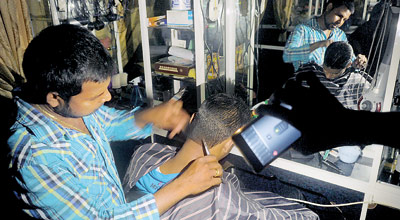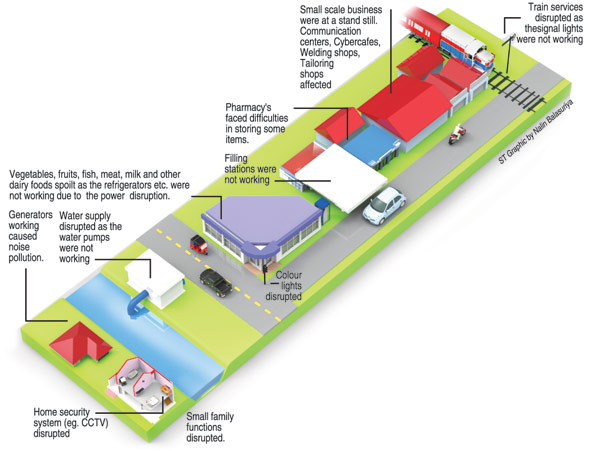News
Frustration boils over as cuts hammer small business

A haircut by torchlight. Pic by Amila Gamage
Anger and frustration showed among small business owners, hit hardest by the power interruptions throughout this week.
“We depend on electricity to do most of our work here,” said Wimalanath, 36, who works at a small laundry on the Galle Road and faces the difficult prospect of losing part of his wages as the power cuts had hit the business hard.
“We start at 7.30 in the morning but these last few days we have been losing power soon after we start. With these power cuts, we’re looking at a loss of about half a day’s work every day.
“We are behind on our orders and when that happens customers don’t come again. That means less business for our boss and this translates to lower wages for us,” he explained.
It was the poor man who ends up suffering the most in these types of crises, Wimalanath pointed out. “It is the government’s responsibility to ensure that these things don’t keep happening. The people depend on them to get these services right.”
Rafeek, 52, who owns a small eatery near the Fort Railway Station, said power interruptions have a severe impact on his business. “We can’t even make tea. Preparing most foods is difficult. Customers also don’t like to come in and dine when there is a power cut because the heat is very intense,” he lamented.

Mobile Phone Shop owner M.H.M. Niyas. Pic by Anuradha Bandara
Ram, 53, a cashier at the Saravana Bhawan Hotel along the Galle Road complained about power being interrupted for lengthy periods without warning. “Luckily we have a generator here, but we still have to take great care when preparing food,” he said.
Small filling stations in the area were unable to pump fuel to vehicles as the fuel pumps rely on electricity.
At the Dr. Mobile Phone Shop in Dehiwala, owner M.H.M. Niyas, 55, told us he had been forced to close the shop early and send his employees home for the past several days due to power interruptions.
“We can’t repair phones or batteries without electricity. We can’t even check if some of our products, such as chargers, are working when we are selling them to customers,” he said.
Although the shop has an air-conditioner but this stops when the power cuts out and Mr. Niyas said he then had to open the shop’s door to let in at least some air and make the intense heat a little bearable. “But,” he said, “our shop is right on the Galle Road and it doesn’t take long for dust to come in and settle over everything. This is obviously very bad for both our health and the products we sell.”
At the market complex in Dehiwala, anger at the state of affairs was multiplied by conspiracy theories that the power cuts were being imposed because some government ministers had a stake in the sale of generators.
M. Dhanapala, 60, a fish vendor, was adamant that the power cuts had been “manufactured” by the government to boost the sale of generators. “Who is bringing them down? If you dig deep enough, you’ll find some government minister or several ministers have a stake in the companies importing these generators,” he claimed.
Pointing to stalls where vendors were selling fish, fruits and vegetables, he said, “So much of the food starts rotting quickly when we don’t have power for lengthy periods.
We have been without power for four to five hours in the day and more at night.”
Most vendors were also forced to pack up and leave early because of power cuts in the night. “People don’t like to step out when there’s no power at home, and even the ones who do don’t come here as this place looks extremely dark and foreboding without any lights,” one vendor said.
A woman who maintained a stall, who declined to give her name, lamented that she had two schoolgoing children and was finding it difficult to feed them. “It is always the poor people who suffer,” she observed. “But is the government going to compensate for our losses? All they do is make promises. I have promised myself not to cast a vote any more as all politicians are the same.”
The vendors said bitterly that notwithstanding the cuts the electricity board would send them their electricity bills on time while the Dehiwala-Mount Lavinia Municipal Council was similar, insisting on the monthly rent for using the complex irrespective of business losses caused by the power stoppages. “Our difficulties don’t worry them,” said Mr. Dhanapala.
Pharmacies are finding the power interruptions to be a major inconvenience. Sivam, 32, an employee at a Dehiwala pharmacy, pointed out that most prescription medicines had complicated names and can cause confusion.
“Imagine us having to read these prescriptions in near darkness,” he said. “It’s really difficult as we have to be careful not to make a mistake.
“The power cuts also make it easier to steal from our shops,” he said, and added that though the pharmacy is open from 8.30 a.m. to 10.30 p.m., employees have observed that customers had decreased in the evenings when there was no power.
“As for medicines, there are certain drugs and injections that we need to keep at a certain temperature and this is obviously impossible when the power interruptions come.
That is a big loss to us. We also sell some food items and have been forced to throw away some products, such as ice cream, because they are no longer fit to be consumed,” Sivam said
A worker at a small shop providing welding services noted that the first thing he and his fellow workers encountered every morning during the crisis was verbal abuse by frustrated customers.
“People are angry because we are behind on our orders. But what are we to do? We have been losing half a day’s work each day this week on account of the power interruptions. We just can’t keep up with orders when that happens,” he pointed out.

